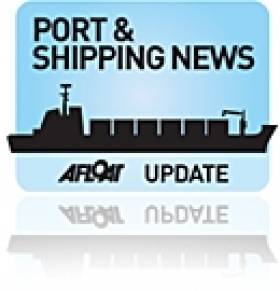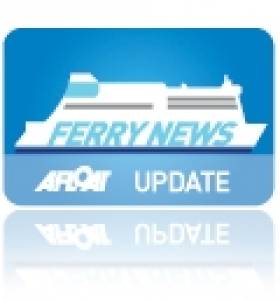Displaying items by tag: Lady Gaga
Ports & Shipping Review: Stena HSS Comes and Goes, Shackleton Exhibition, Cork Harbour Open Weekend,Cargoship Dispute and Ferry Strike
#PORTS & SHIPPING REVIEW - Over the last fortnight Jehan Ashmore has reported from the Shipping scene where the Stena Line HSS seasonal-only operated Dun Laoghaire-Holyhead service completed its final sailing for the summer, though sailings are to resume over Christmas/New Year period.
Despite the HSS Stena Explorer's last high-season sailing on 11 September, the fast-ferry made a return call to Dun Laoghaire five days later, for a special freight-only charter, to load stage trucks following the Lady Gaga concert held in the Aviva Stadium, Dublin.
Incidentally the ferry terminal in Dun Laoghaire now features a new exhibition space, where the Tanaiste Eamonn Gilmore, T.D. officially launched the Shackleton Endurance Exhibition – 'Triumph Against All Odds'.
The Cork Harbour Open Weekend provided a great opportunity for locals and visitors alike to see what the world's second largest natural harbour has to offer, in terms of activities held on and off the water, including trips to Spike Island.
At Cobh a detained French registered fishing vessel was escorted to the town by the Naval Service OPV L.E. Roisin, following alleged breaches of technical fishing regulations.
A Dutch owned cargoship, the Julia, which docked in Drogheda Port faced arrest, following claims by its crew that they were owed in total $102,700 in unpaid wages to them.
The summer may be over, but that's not stopping Irish Ferries offering Autumn short shopping breaks and wine mini-cruises on the route to Cherbourg.
While rivals Celtic Link Ferries, found themselves taking additional business at short notice, as passengers were transferred from the cancelled Brittany Ferries Roscoff-Cork sailing, following strike-action by French staff over a dispute on new working conditions.
Celtic Link Ferries will however be expecting a response from customers as they take part in Gathering 2013, as the ferry operator are offering free car travel on 15th March next year in advance of St. Patricks Day celebrations.
Leo Varadkar, Minister for Transport, has appointed James Frater to the board of the Dublin Port Company. The Scot has held senior positions at ports in the UK, Egypt, Hong Kong and Oman.
Stena Line's HSS Service Sounds Good for Lady Gaga
#LADY GAGA– Stena Line's HSS Stena Explorer is set to return to Dun Laoghaire Harbour this Sunday, despite last Tuesday's end of season sailings to Holyhead, as previously reported on Afloat.ie. The HSS has been specially chartered in to transport stage trucks following the Lady Gaga concert to be held this weekend in Dublin, writes Jehan Ashmore.
The US pop-star is to play her only Irish tour date on Saturday night in the Aviva Stadium. Following the New York musician's 'The Born This Way Ball' performance, the stage equipment is to be transported from the Ballsbridge venue by a convoy of 25 freight trucks to the ferryport in Dun Laoghaire for the sailing to Holyhead.
On arrival of the HSS into Dun Laoghaire, the fast-ferry will be in a 'light' mode, i.e. no passengers or vehicles on board. However on the return leg to Anglesey, the craft will be loaded with the stage trucks on the vehicle decks that are capable of loading in total 50 lorries (each of 15m in length).
Upon arrival in Holyhead, the truck convoy will travel 'landbridge' across the UK as they proceed onward to The Netherlands, where the tour continues in Amsterdam, at the cities Ziggo Dome.
However normal HSS sailings are to resume for 12 days over the Christmas /New Year period, for further information visit: www.stenaline.ie/ferry/book-now/hss-christmas-sailings-2012/

























































